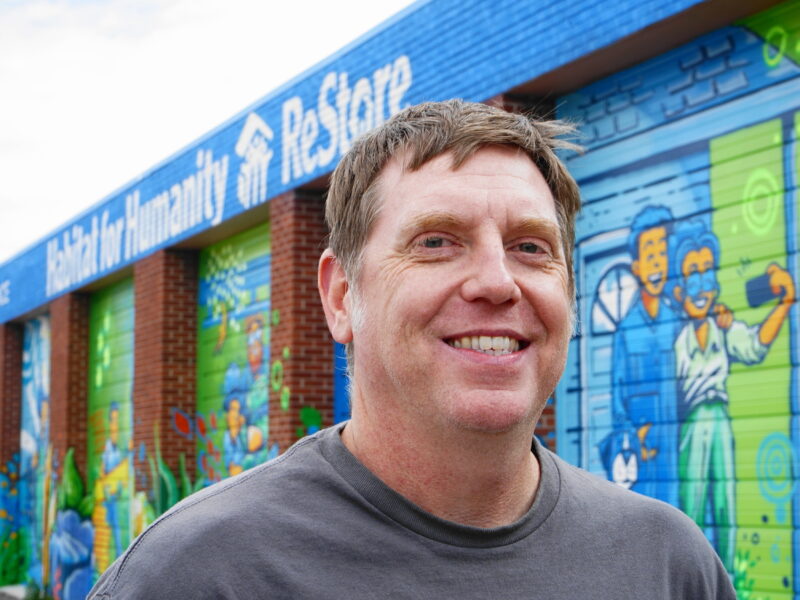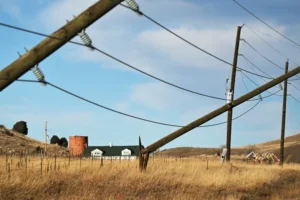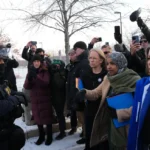FRIDAY FOCUS: Habitat For Humanity Executive Director On Affordable Housing Crisis in Wyoming
After career switch, Dan Dorsch strives to spark housing conversation
- Published In: Other News & Features
- Last Updated: Oct 27, 2023

Pictured here is Dan Dorsch, the new executive director at Habitat for Humanity of Laramie County, at the ReStore. The ReStore, located at 715 E. 15th Street, in Cheyenne, is just one of many programs aimed at helping families buy and maintain their homes. (Wyoming Truth photo by David Dudley)

By David Dudley
Special to the Wyoming Truth
CHEYENNE, Wyo.—The COVID-19 pandemic did more than damage the global economy and upend public education nationwide. It also impacted the availability of affordable housing.
Between 2019 and 2021, the national shortage of affordable rentals – those that are affordable to families with incomes at or below the federal poverty line or 30% of the median income in their area – increased by over 500 thousand units, according to the National Low Income Housing Coalition.
The problem, the report stated, has been exacerbated as the number of low-income families grows and the supply of affordable homes decreases.
In Wyoming, where 25% of all renter households are “extremely low income” — meaning a four-person household earns $26,500 or less — supply is short of demand by 10,215 units.
“There are people in Wyoming who work 40 hours a week, but they can’t afford to live in the communities where they work,” said Dan Dorsch, the new executive director of the Laramie County chapter of Habitat for Humanity, (HFH), one of six chapters in Wyoming of the U.S.-based nonprofit that helps low-income families around the world buy, build, improve and maintain their homes. “Housing has become more expensive, and wages aren’t keeping up. This creates housing insecurity, which contributes to homelessness.”
The Laramie chapter, with an annual budget of $1.25 million, has built 51 homes in Laramie County since its founding in 1991 – each one with the help of 200 volunteers, Dorsch said. Three more houses are now under construction.
Dorsch, 44, who left his job as a financial adviser at Thrivent in 2020, knows something about the finances and fundraising necessary to run a successful nonprofit. Raised primarily in Woodward, Oklahoma, Dorsch earned a bachelor’s degree in business from Texas Tech University and moved to Cheyenne in 2012 when his wife, Angie, became executive director at Equal Justice Wyoming.
Dorsch also serves as vice chair of the Mayor of Cheyenne’s Affordable Housing Task Force and is a member of Gov. Gordon’s Workforce Housing Working Group. He recently spoke to the Wyoming Truth about affordable housing across the state. What follows are excerpts from that conversation.
How would you describe the affordable housing situation in Wyoming right now?
Dorsch: There’s a growing shortage, and it’s impacting communities across the state. But housing is a complicated issue, and no single thing is gonna solve everything. So we have to take a multi-layered approach to solving it. We need a coordinated effort between federal, state, county and city governments, as well as advocacy and community groups.
How can Habitat for Humanity help?
Dorsch: We offer a number of programs for low-income families. We offer help with repairs for low-income families, upgrades to make homes safer for elderly and disabled people—categories that many of the people we help fall into.
What kinds of repairs or upgrades do you provide?
Dorsch: For elderly people, who are struggling with mobility, we rip out bathtubs and install walk-in showers. Or, for people who use wheelchairs, we’ve installed ramps to make their homes more accessible. We’ve also replaced roofs for those on fixed incomes.
For home-owners looking to do home improvement more affordably, our Re-Store is a great resource. We sell furniture and other household items, but also supplies like paint and light fixtures, appliances and piping, to name just a few. The funds raised through the Re-Store go toward our programs. But the main program is our Home Builds, where we build homes for low-income families.
How do people qualify for that program?
Dorsch: To qualify, applicants have to earn between 30% and 60% of the area median income. [According to a recent report by HUD, that’s $28,200-$75,300 for a family of four.] They have to prove that they can afford the mortgage. You know, our motto is “Offering a hand up, not a handout.” They pay a 30-year mortgage, but with 0% interest, which helps make it affordable as well. They pay property taxes, they pay insurance, and they also have to do 400 hours of sweat equity, which means they help build their home alongside our volunteers. That helps keep our costs down to make the home more affordable.
What is the impact of the home build program?
Dorsch: The impact is huge. You know, it’s not just the impact of this one family that has a home. There’s a generational effect that allows them opportunities that they may not have if they just rented their whole life. Because most of the time, rent is higher than a mortgage payment, and there’s no equity buildup. That money’s just gone each month.
Then, there’s the impact of having a safe, stable place for the kids to grow up in. And that has impacts that ripple out into the community. It allows families to feel like they’re more part of that community, so they take an interest in it. They’re living where they work. They’re paying taxes that help the community. And, having an affordable mortgage, they usually have more income to spend in the community.
What challenges are you facing?
Dorsch: Fundraising and education are our biggest hurdles right now. The cost of everything has gone up, so we need to raise more money than we did just three years ago. Where education is concerned, there just isn’t enough awareness. That’s one of the main functions of the Mayor’s Affordable Housing Task Force. Right now, if you build an apartment building within Cheyenne city limits, 30% of your materials have to be brick and stone, which really adds a lot of cost. And it’s just for aesthetic purposes.
There’s no structural integrity standard or anything like that behind the requirement. It’s just about the way things look.
Then, we’ve been talking a lot about the need to build up, not out, which will require changes to the current zoning laws. We’ve been talking about utilizing the blighted and vacant properties within the city limits that may already be connected, or are closer to get connected, than outlying areas. It’s more affordable and effective to connect to existing infrastructure rather than building more roads and lines and pushing them out into the county.
I’m proud of that work, because it’s really got the conversation going. Our city government is talking more about this issue, which has got a lot more people talking about housing and how important it is for our community. . . . Getting more people into homes they can afford helps economic development all around.













